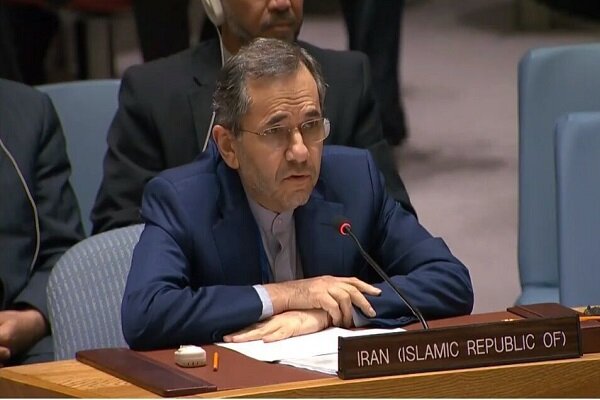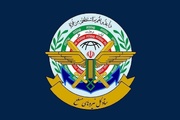"This 'maximum deception' campaign is in line with and a living example of the so-called 'maximum pressure' policy of the United States against Iran," Majid Takht-e Ravanchi said in separate letters to the United Nations and the UN Security Council on Friday.
He added that Iran has repeatedly announced that none of its "ballistic missiles are designed to be capable of delivering nuclear weapons" and added that paragraph 3 of annex B to Resolution 2231 (which endorses a nuclear deal signed between Iran and major world powers) does not limit, in any way, Iran’s activities regarding the conventional ballistic missiles.
He warned that the continuation of US hostile policies and practices would further erode the Security Council's credibility, which already faces a severe trust and confidence deficit due to such irresponsible policies of that country.
The full text of the letter is as follows:
Excellency,
I am writing to you regarding the identical letters dated 29 August 2019 from the Chargé d’affaires a.i. of the United States Mission to the United Nations addressed to the Secretary-General and the President of the Security Council wherein certain baseless accusations were repeated against my country S/2019/705.
As we have stated time and again, none of Iran’s ballistic missiles are “designed to be capable of delivering nuclear weapons” and accordingly, paragraph 3 of annex B to resolution 2231 (2015) does not limit, in any way, Iran’s activities regarding the conventional ballistic missiles.
Consequently, Iran’s related activities are not inconsistent with that paragraph. Rather, they fall outside of the purview or competence of the Security Council resolution and its annexes (S/2015/550).
We continue to firmly reject the desperate attempts by the United States for the arbitrary reinterpretation of paragraph 3 of annex B to resolution 2231 (2015), including through invoking the definition of the Missile Technology Control Regime.
There is no implicit or explicit reference in that paragraph either to the Missile Technology Control Regime itself or to its definitions and, thus, any reference thereto is totally misleading. Moreover, while the Missile Technology Control Regime criteria are not legally binding, even for its 35 members, any attempt to portray them as the universally agreed definition is definitively premature.
As stated in the report of the Secretary-General (A/57/229), “there is no universally accepted norm or instrument specifically governing the development, testing, production, acquisition, transfer, deployment or use of missiles.”
Moreover, when the previous missile launches by Iran were discussed, “there was no consensus in the Security Council on how this particular launch related to resolution 2231 (2015)” (S/2017/515).
Additionally, while the United States, by its unlawful withdrawal from the Joint Comprehensive Plan of Action and its subsequent policies and practices, has materially breached resolution 2231 (2015), its call for reimposing the restrictions contained in Security Council resolution 1929 (2010) -- which is a terminated and, in fact, dead resolution -- is ironic. Likewise, it is hypocritical that the United States, which arrogantly continues to threaten other States either to violate resolution 2231 (2015) or face punishment, is calling for the full implementation of that resolution. If the implementation of resolution 2231 (2015) matters for the United States, it should end violating it itself and also stop forcing other States to violate that resolution.
Additionally, the reference by the United States to “existing sanctions on Iran” is misleading and legally void as there are only certain restrictions, not “sanctions” within the context of resolution 2231 (2015).
In fact, when the United States, a permanent member of the Security Council, chooses to defy the Council’s resolutions repeatedly without consequence, it seriously undermines the fundamental credibility of the Council.
If unchecked, such policies and practices of the United States would further erode the credibility of the Security Council, which already faces a severe trust and confidence deficit due to such irresponsible policies of that country. Therefore, we once again call upon the international community to hold the United States accountable for its actions. In this context, we ask that the Secretary-General take actions of the United States as described in the present letter into account in his upcoming report on the implementation of resolution 2231 (2015).
I would also like to reiterate that Iran has not conducted any activity inconsistent with paragraph 3 of annex B to resolution 2231 (2015), and accordingly, it is determined to resolutely continue its activities related to ballistic missiles and space launch vehicles, both of which are its inherent rights under international law and are necessary for securing its security as well as socioeconomic interests, respectively.
At the same time, since Iran’s activities related to space launch vehicles and ballistic missiles fall outside the purview or competence of resolution 2231 (2015) and its annexes, the Secretary-General is therefore expected to seriously avoid reporting on Iran’s such activities in his next reports on the implementation of that resolution.
Seizing this opportunity, I would also like to categorically reject the allegations against Iran made by the Permanent Representative of the United States at the 8619th meeting of the Security Council on 16 September 2019 (S/PV.8619).
It has become a standard practice of certain officials of the United States who, following any incident -- no matter where and by whom – without exception, immediately and without any investigation and evidence, declare Iran as the culprit. This “maximum deception” campaign is in line with and a living example of the so-called “maximum pressure” policy of the United States against Iran.
It is evident that no amount of smear campaign, disinformation and deception against Iran can change the realities about the illegal practices and irresponsible policies of the United States or distract attention away from its destructive policies, malign behavior and destabilizing measures, in particular in the Middle East. Instead of such futile attempts and baseless allegations, the United States must stop exporting an unprecedented amount of sophisticated weaponry to the Middle East, which are used including for death and destruction in Yemen by the closest regional allies of the United States.
I should be grateful if you would have the present letter circulated as a document of the Security Council.
Please accept, Excellency, the assurances of my highest consideration.
MNA/PR

























Your Comment